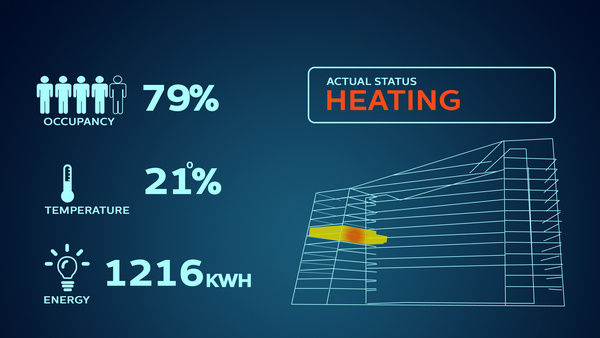-
Template office of the future for greater comfort, productivity and building efficiency
-
Workers able to personalize lighting and temperature via smartphone app
-
Connected LED lighting powered over Ethernet provides anonymous occupancy and climate data for more efficient facility management
Royal Philips, the global leader in lighting, today announced a breakthrough connected office lighting system that delivers extraordinary value to facility managers, office workers, and building owners.
The groundbreaking system uses Power-over-Ethernet (PoE) to connect office lighting fixtures to a building’s IT network. The lighting system acts as an information pathway, enabling workers to control and access other building services via their smartphones, allowing them to enjoy greater visual comfort and productivity.
 |
|
Energy savings from Philips new PoE LED smart lighting system. (LEDinside/Philips) |
The office lighting fixtures, when outfitted with sensors, are able to capture anonymous data on room occupancy, temperature and humidity. They connect to the IT network and interface with other building systems such as heating, ventilation and IT services. This benefits the facility manager who has a single system showing real time and historical views of building utilization. For example, he or she could see that on a Friday afternoon a particular floor is not used and adjust the temperature, lighting, and cleaning roster accordingly. Having an integrated view of a building’s occupancy patterns and energy usage provides for more informed decision making with unprecedented levels of energy and operational efficiency.
Philips will present its connected office lighting system at Light + Building, the world’s biggest trade fair for lighting and building services technology in Frankfurt (March 30 – April 4, 2014).
Smartphone control
The Philips system allows office workers to control the lighting in open plan offices as well as temperature in meeting rooms, to suit their individual preferences. Their smartphones will detect their location from overhead lighting fixtures via an app.
“The LED lighting alone is 80 percent more efficient than conventional lighting. Personal control of the lighting by employees actually increases efficiency as general lighting levels can be kept lower.’’ said Jeff Cassis from Philips Lighting. “The potential savings on a building’s operational costs will be significant, given that heating, cooling and lighting together account for 70% of a building’s energy usage.¹”
The fixtures, outfitted with wireless communications devices, form a dense indoor positioning grid, like an indoor GPS, that support a range of location-based services, such as wayfinding. Through a smartphone app, the system could also provide workers with useful information such as the nearest empty meeting room.
Delighting building owners and facility managers
For building owners, the system offers new value that goes beyond energy efficiency and cost savings. Advanced capabilities such as indoor positioning combine with the intelligent system to enable comfort, personalization, and safety, increasing the total value of a building and making it more attractive to tenants.
Standards-based PoE-enabled fixtures also deliver significant cost savings on lighting installation. As these fixtures receive both data and power over a single Ethernet connection, there is no need for expensive electrical wiring, reducing installation costs by up to 50%.
The connected lighting system installed at ‘The Edge’, a cutting-edge office building being developed by OVG Real Estate for Deloitte in Amsterdam, is the first of its kind. As pioneers in workplace innovation, Deloitte and OVG Real Estate chose Philips and its connected lighting system to help the building meets the highest standards of sustainability (certified BREEAM² - Outstanding).
“Innovation is our top priority at Deloitte and we want to create a more intuitive, comfortable and productive environment for our staff. We also see our office raising the bar in data analytics with completely new insights in the use of office space, leading the way for offices to reduce the CO2 footprint of buildings and create a more sustainable world.” said Erik Ubels, Chief Information Officer at Deloitte in the Netherlands.
Coen van Oostrom, Founder & CEO from OVG said : "Our innovative partnership with Philips and Deloitte/AKD for this project at ‘The Edge’ will result in a new blueprint of sustainable development for the building industry. We are proud to implement and co-create this building management system together with these leading companies to drive value for building owners, tenants and office workers. This project fits our ambition to stay in the driver's seat for sustainable office innovation."
Philips is showcasing its connected office lighting system at the 2014 Light + Building show. Visitors to the show will be able to experience the system at the Philips stand in the Forum, Level 0, stand A01.
¹ Frost and Sullivan
² The highest ranking according to the internationally recognized Building Research Establishment Environmental Assessment Method (BREEAM)












